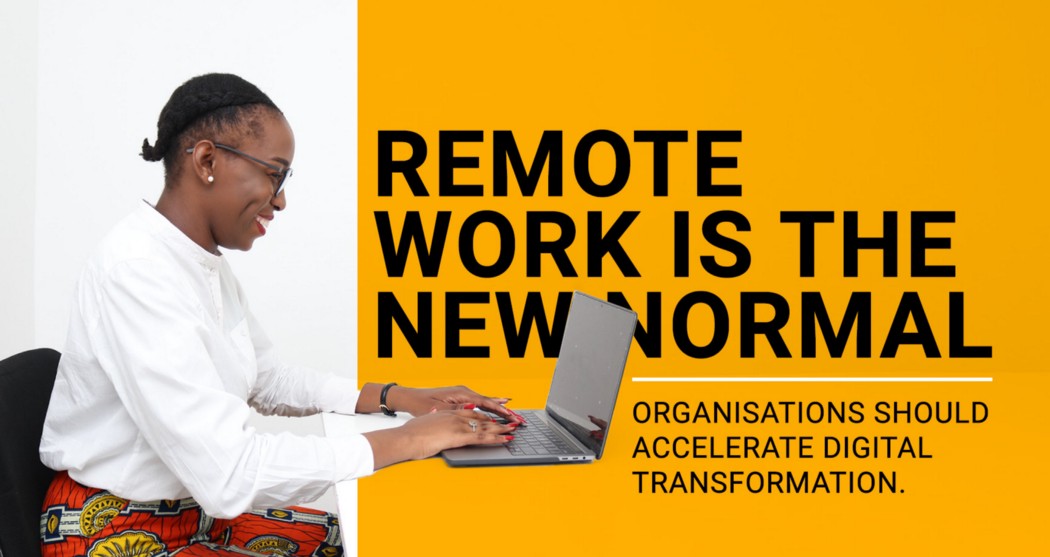
The COVID-19 pandemic worked as a catalyst in changing the way people work in a short period of time. In order to remain operational, organisations adopted remote work which has forced staff to work from home. This drastic shift to a digital way of working was not prepared for and it did not happen smoothly for many organisations. As a matter of fact, many organisations are still struggling to deal with the challenges that come with remote work such as securing the infrastructure and resources for remote work.
For organisations that have never recognised the need to embrace technology in their work, it has proven difficult for them to implement remote tools and to figure out which digital collaboration tools to use in order to manage teams and ensure their productivity. This can, in turn, make such organisations delay digital transformation with the hope that they will resume their normal operations soon. This is a temptation that should be avoided as remote work is becoming the new normal and spur on digital transformation out of necessity.
Is Zambia ready for such a transformation?
For remote work to be a success, the technology infrastructure should be developed enough to allow organisations to work productively and securely from home. While the technology involved is a pertinent medium for remote working, knowing the right tools to use for remote work is more important. Now is Zambia ready for this digital way of working?
The digital landscape in Zambia can help us favourably answer this question. Generally, there is very low internet penetration in the country but this is fast changing as the government and the private sector continue to put in efforts to increase and improve internet access across the country. Zambia, in the two decades that it embraced technology, has seen tremendous progress in digital transformation. This progress, however, has taken place at a slow pace due to reasons such as the cost of internet connection, lack of investment in the sector and the lack of infrastructure.
Despite all these challenges, Zambia has continued to make strides in innovation and technology as can be evidenced by the birth of innovation and tech hubs.
With this said, it is important for organisations to take advantage of the current technology infrastructure and digital tools to ramp up their remote working strategy and still remain relevant even in this crisis.
Our Story: How we are adapting to remote work
As an innovation and technology hub, we place technology at the core of our daily work. We utilise digitally cutting-edge tools that help us collaborate with as little physical interaction as possible. We slowly started transitioning to remote work even before any Covid-19 case was recorded in Zambia. We fully went remote once the country recorded the first few cases. On top of the collaboration tools that we have always used such as Slack, G-Suite, WordPress and Jira, we have continued to integrate other remote working tools which include ClickUp and jibble.
During this time of closures and cancellations, we have kept the community engaged through online events such as webinars and we have continued to host most of our physical events virtually.
Recognising that remote work can cause employees to feel isolated and possibly lose their morale, we introduced the Hive Connect; an online-themed session which allows staff to talk about different topics which are not necessarily work-related and connect beyond the confines of work. To further give staff a sense of belonging and togetherness, we continued our physical peer-to-peer chats virtually.
Digital transformation; how do you ease the process?
Digital transformation is more than just introducing new technology that changes the way an organisation operates; it also involves the willingness and capability of staff to adapt to the new changes. While digital transformation can be anything from artificial intelligence-driven sales techniques to online delivery of products and services, employees may react to these changes differently.
For organisations that are already technologically inclined, it only takes reimagining the integration process while for those organisations that didn’t necessitate a digital way of operation will have to employ a digitally agile method of operation for them to still remain relevant. Here are some ways your organisation can integrate new tech.
Take it slowly
You won’t expect your staff to embrace the new changes as soon as you introduce them. It might be tempting to implement the changes all at once in order to keep your business afloat but missing out an essential step in the transition process such as training is a recipe for failure and frustration. Give your employees ample time to associate themselves with the tools before they can fully engage with them. Remember, digital transformation is not just about the digital tools, its also about the mindset of the people involved in the process!
Make training a priority
Allow your staff to experiment with the digital tools while you also provide support by constantly training them. Use video tutorials or hands-on training where possible. For each tool that you introduce, make it part of your training process to get reviews on how your employees are adapting. The reviews might help you address the gaps in the training process. You might want your staff to experiment with the tools in small teams so that they are comfortable to ask their colleagues.
Denying the chance your employees to make mistakes and learn can bring about technology rejection where staff may not engage with the tools at a maximum.
Analyse your business requirements
For a digital transformation to be successful, you need to streamline what remote working tools suit your kind of business. It is also important to recognize your current business state, its operations and employee skill sets. This process will help you categorise your transformation process by knowing which tools or strategies you would need to implement the earliest. When you think of digital transformation, think of tools that will improve your product and service delivery as well as company culture. Don’t waste time on tools that will not help achieve organisational goals. If your digital transformation involves digital marketing to generate more leads or even if it involves customer support where customers can use digital modes to contact your business and get a quick response and solution to their query, then focus on that!
Plan your budget
Your digital transformation strategy should involve how much resources you are willing to allocate towards the process. Make a budget that resonates with your business goals to avoid spending on technology that you won’t have to use. It is important to secure funds for the long term because the transformation is an ongoing process
Consider Outsourcing
If you don’t have the capacity to train your team in the use of digital tools, outsource trainers who can train your staff and help you strategize on how you can achieve customer satisfaction while working remotely.
Given the disruptions that the pandemic has caused on many businesses, it is only essential that organisations accelerate their digital transformation plans now.
Would you like us to guide you through this process? Get in touch with us!
 BongoHive
BongoHive